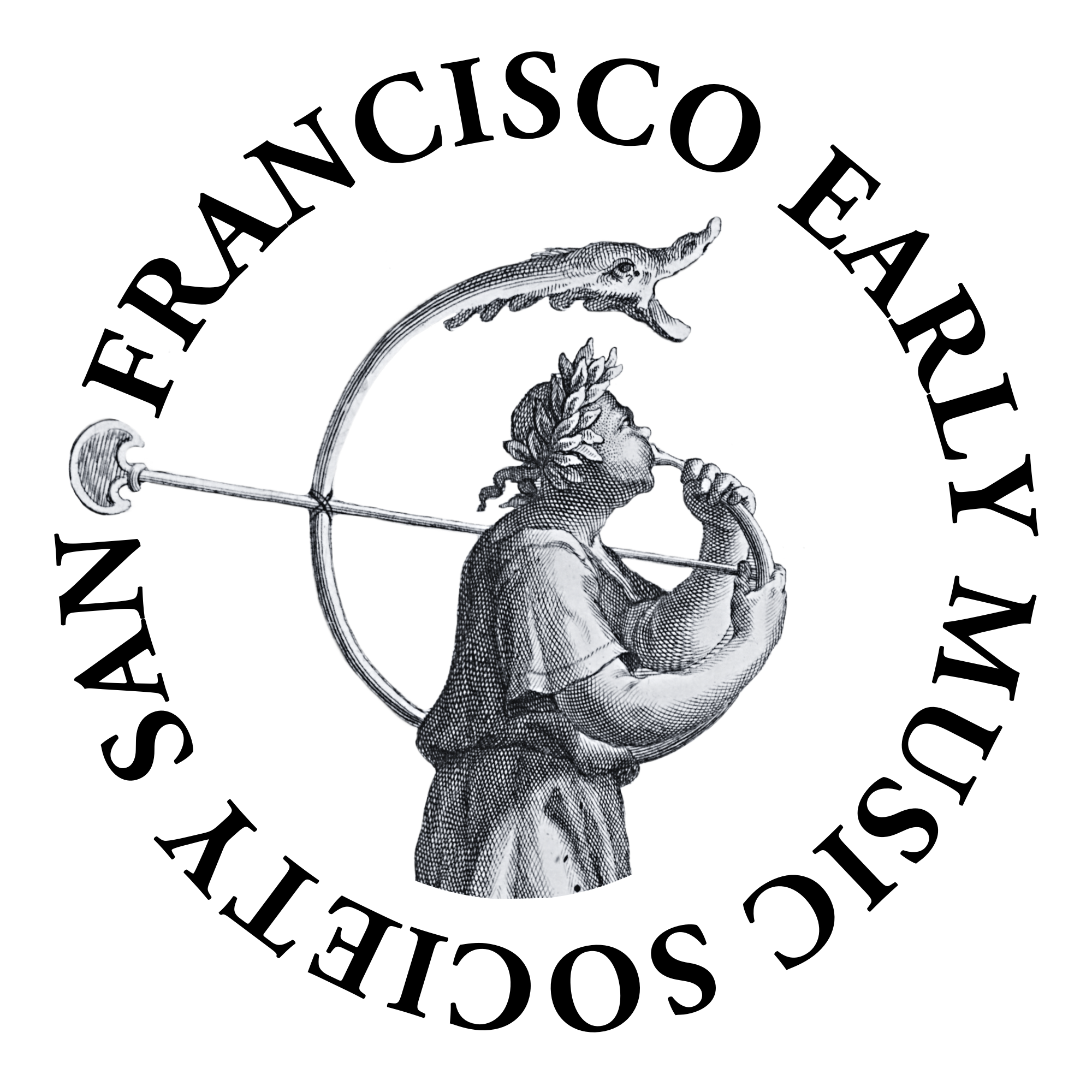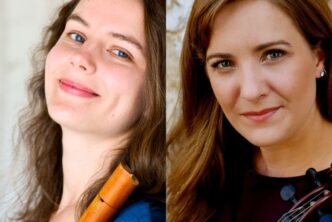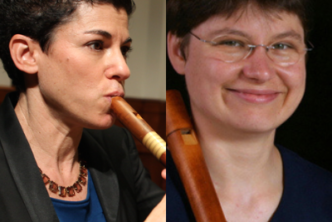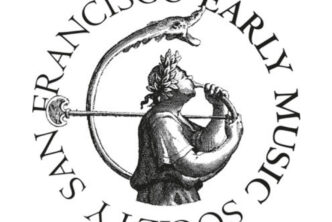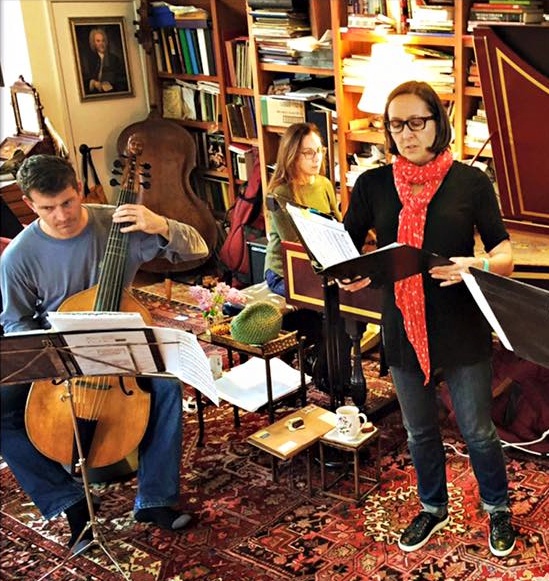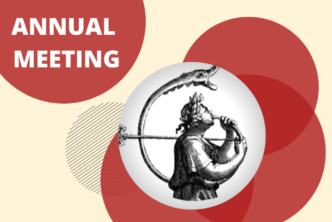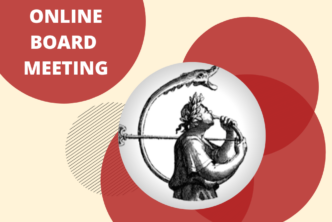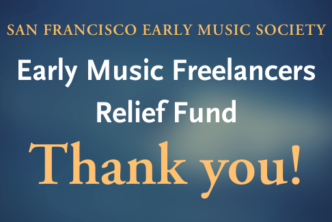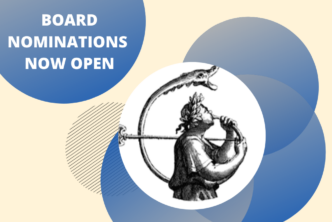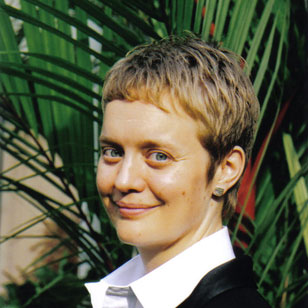SFEMS 2018–19 SFEMS Concert Season
The SFEMS annual concert series always seems a bit like Forrest Gump’s box of chocolates. You never know quite what you’ll get, but you may be sure it will be sweet. Last year’s series certainly was broadest in recent memory, spanning almost seven centuries, from Hildegard to the French Rococo. The recently concluded Berkeley Festival pushed the envelope even further, to what may be historic proportions for an historical performance festival, a full millennium, from 10th-century settings of pagan song to Debussy’s piano music at the turn of the 20th century. What still tied it all together was the dedication of our artists to using the instruments and practices of the time to understand and reveal new qualities of their music.
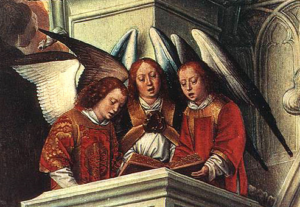 The 2018–19 series takes a different course, partly by choice, but even more because of some strong proposals our concert committee received. Repertory this year will be closer to our traditional understanding of early music. With one very interesting exception, the season will be devoted largely to baroque and especially Renaissance works. What makes the year exceptional and compelling, however, is the strong presence of the human voice. Three of our six regular series concerts and two of our three special concerts will feature vocal music; and four of that total nine will be devoted exclusively to the voice.
The 2018–19 series takes a different course, partly by choice, but even more because of some strong proposals our concert committee received. Repertory this year will be closer to our traditional understanding of early music. With one very interesting exception, the season will be devoted largely to baroque and especially Renaissance works. What makes the year exceptional and compelling, however, is the strong presence of the human voice. Three of our six regular series concerts and two of our three special concerts will feature vocal music; and four of that total nine will be devoted exclusively to the voice.
Why the human voice? The voice is our first instrument, our most ancient instrument, and also the most perfect, personal, and expressive, the instrument all others strive to imitate. Indeed, our voices shape our experience of time. All music, but especially song, have given voice to our passions and desires, our work and celebration, our hopes and fears, interpreting and enriching our worlds. Through music, our voices have spread the words of history, expressed our deepest feelings and devotions, sung the world as we know it, and sung our souls to the world. There is no more powerful way to enter another age and know our forebears’ lives, minds and hearts than through their song, hearing how their voices shaped time.
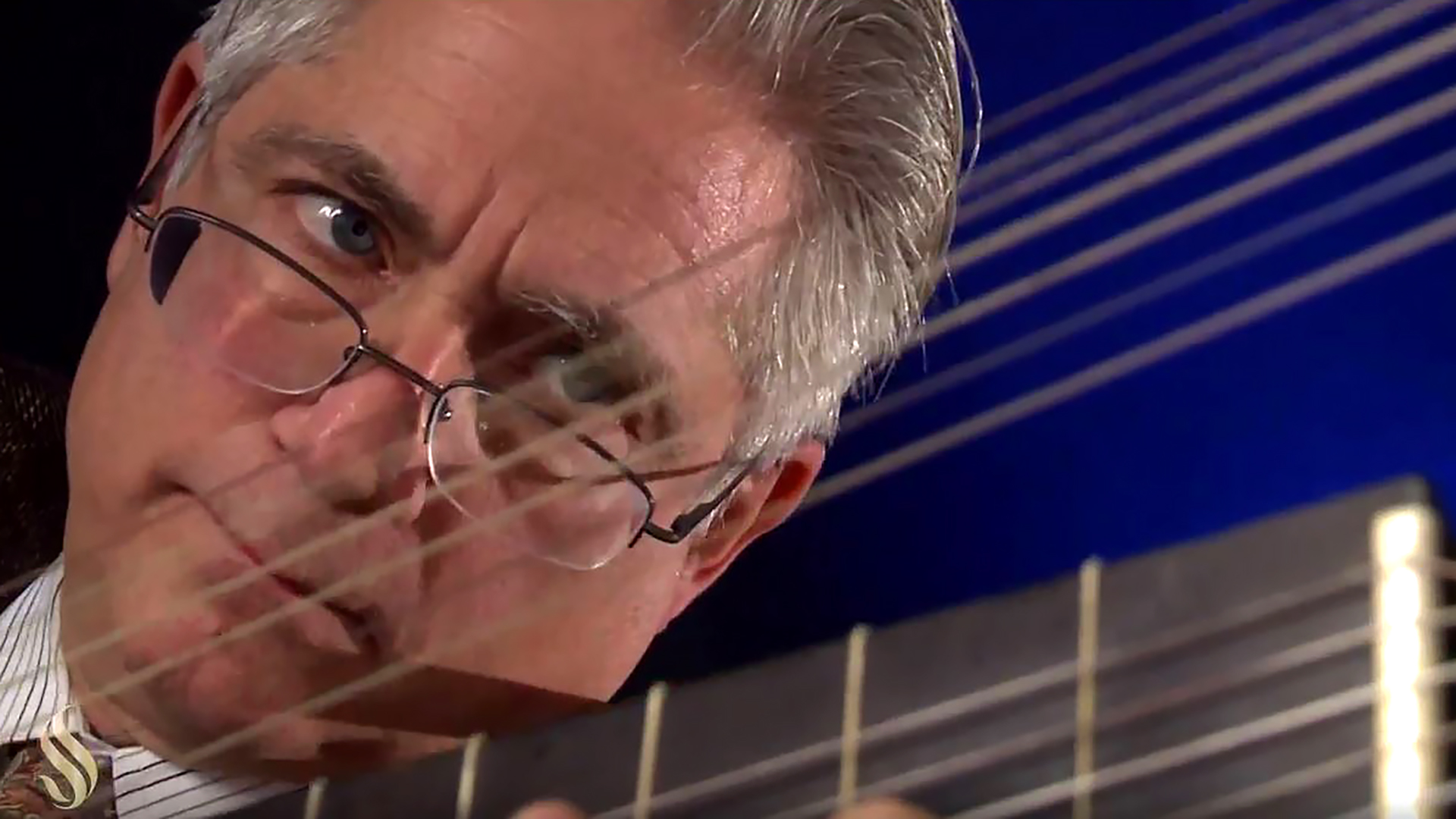 Our regular series begins the weekend of October 12–14 with the return of El Mundo, directed by world-renowned guitarist and lutenist Richard Savino. Their program, “Kingdoms of Castile,” will take listeners on a musical journey from Castilian courts and cathedrals to Spanish-influenced Italian cities like Naples and on to the viceroyalties of Peru, Mexico, and Guatemala, where classical tradition blended with indigenous and African dances to create a music unique in all the world.
Our regular series begins the weekend of October 12–14 with the return of El Mundo, directed by world-renowned guitarist and lutenist Richard Savino. Their program, “Kingdoms of Castile,” will take listeners on a musical journey from Castilian courts and cathedrals to Spanish-influenced Italian cities like Naples and on to the viceroyalties of Peru, Mexico, and Guatemala, where classical tradition blended with indigenous and African dances to create a music unique in all the world.
The concert will focus on the villancico, a song form derived from the medieval Arabic Zajal, which emerged in the 15th century and evolved over the next three centuries to become the dominant vocal genre throughout Spain and Latin America. The dance-like, often folkloric aspects of the music, often married with texts of great wit and sophistication, created a style that even in sacred compositions bears the imprint of folk music, a delightful intersection of elegance and simplicity.
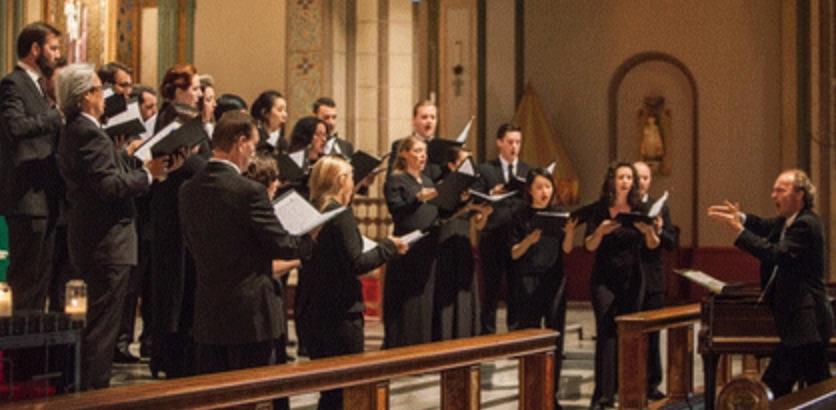 The weekend of November 30–December 2, we take great pleasure in presenting the series debut of Cappella SF, directed by Ragnar Bohlin. Bohlin, who is also conductor of the San Francisco Symphony Chorus, has created a superb, professional chamber choir, praised by San Francisco Classical Voice for their “stunning technical accuracy, amazing vocal control, and impressive intensity of affect.” The San Francisco-based ensemble performs a cappella choral works from all periods. Their program for our series, “Neither from Heaven nor from Earth,” covers three centuries of sacred music, including Josquin des Préz, Miserere mei Deus; Gregorio Allegri, Miserere mei Deus; François Couperin, Deuxième leçon de ténèbres pour le mercredi saint; and Heinrich Schütz, Musikalische Exequien.
The weekend of November 30–December 2, we take great pleasure in presenting the series debut of Cappella SF, directed by Ragnar Bohlin. Bohlin, who is also conductor of the San Francisco Symphony Chorus, has created a superb, professional chamber choir, praised by San Francisco Classical Voice for their “stunning technical accuracy, amazing vocal control, and impressive intensity of affect.” The San Francisco-based ensemble performs a cappella choral works from all periods. Their program for our series, “Neither from Heaven nor from Earth,” covers three centuries of sacred music, including Josquin des Préz, Miserere mei Deus; Gregorio Allegri, Miserere mei Deus; François Couperin, Deuxième leçon de ténèbres pour le mercredi saint; and Heinrich Schütz, Musikalische Exequien.
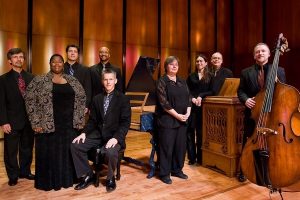 The season resumes in the New Year with our first instrumental program. Ars Lyrica Houston, directed by Matthew Dirst, will appear on January 11–13, 2019, in a program entitled “Semper Phantasticus.” As the name suggests, the concert will focus on the Stylus phantasticus, which dominated the German-speaking lands in the late 17th into the early 18th centuries. As the name also implies, it was a strange, extravagant, passionate style, filled with quirky flights of fancy. Yet it also was constructed with minimal instrumentation, largely because the great musical establishments had yet to recover from the devastation of the 30 Years War.
The season resumes in the New Year with our first instrumental program. Ars Lyrica Houston, directed by Matthew Dirst, will appear on January 11–13, 2019, in a program entitled “Semper Phantasticus.” As the name suggests, the concert will focus on the Stylus phantasticus, which dominated the German-speaking lands in the late 17th into the early 18th centuries. As the name also implies, it was a strange, extravagant, passionate style, filled with quirky flights of fancy. Yet it also was constructed with minimal instrumentation, largely because the great musical establishments had yet to recover from the devastation of the 30 Years War.
Dirst founded Ars Lyrica 20 years ago, and it has been a significant presence in Houston’s cultural scene, developing an early music audience in the region. While the group often has mounted large productions with many musicians, as they did at their BFX debut in 2014, this will be a reduced ensemble, as befits the program. Violinist Elizabeth Blumenstock and gambist Mary Springfels will join harpsichordist Dirst in a program of both unaccompanied and ensemble works, including sonatas by Dietrich Buxtehude and Heinrich Ignaz Franz Biber, two of best-known exponents of the “fantastical style,” and free works by August Kerzinger, Philipp Heinrich Erlebach, Johann Jakob Walther, and even Johann Sebastian Bach.
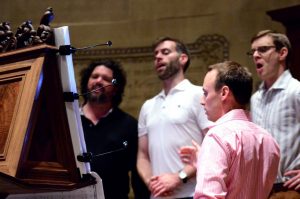 Cut Circle, under the direction of Jesse Rodin, is another fine a cappella group, this one from Stanford University. They will perform the weekend of February 8–10, in a concert titled “To Love Another,” featuring sacred and secular works from the from the late 15th and early 16th centuries. This early Renaissance music is far from the smooth serenity of Palestrina. It is far grittier stuff, and Cut Circle recaptures its emotional intensity. Like fifteenth-century singers depicted shoulder to shoulder, concentrating fiercely on their virtuosic lines, their performances are passionately physical as well as emotional, embracing confident singing, gripping dynamic contrasts, and energetic tempi.
Cut Circle, under the direction of Jesse Rodin, is another fine a cappella group, this one from Stanford University. They will perform the weekend of February 8–10, in a concert titled “To Love Another,” featuring sacred and secular works from the from the late 15th and early 16th centuries. This early Renaissance music is far from the smooth serenity of Palestrina. It is far grittier stuff, and Cut Circle recaptures its emotional intensity. Like fifteenth-century singers depicted shoulder to shoulder, concentrating fiercely on their virtuosic lines, their performances are passionately physical as well as emotional, embracing confident singing, gripping dynamic contrasts, and energetic tempi.
“To love another would humiliate my heart,” sings the devoted lover in Johannes Ockeghem’s famous “D’ung aultre amer,” evoking the power of love to captivate, nourish, and, on occasion, destroy. Love can be earthly and sensual; it can also be spiritual and divine, as when a Biblical figure is cast as the object of desire. The concert will feature music of both romantic and spiritual intensity by Du Fay, Ockeghem, Josquin, and their contemporaries.
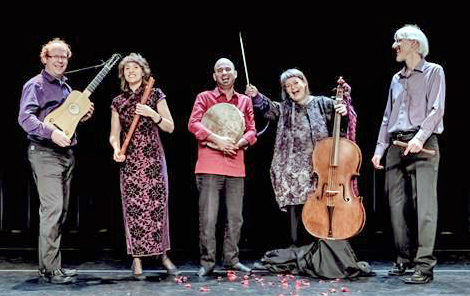 Love also will be the theme of Ensemble Caprice’s concerts, taking place the weekend of April 12–14. Caprice is a wonderful group from Quebec, co-directed by Mattias Maute and Sophie Larivière, and they are returning to our series for the third time in recent years. The group has become known for its innovative and adventuresome approach to an increasingly expanding musical repertoire. Their previous SFEMS programs have explored the cultural intersections of baroque music with the cultural traditions as diverse as Latin America and the Gypsies.
Love also will be the theme of Ensemble Caprice’s concerts, taking place the weekend of April 12–14. Caprice is a wonderful group from Quebec, co-directed by Mattias Maute and Sophie Larivière, and they are returning to our series for the third time in recent years. The group has become known for its innovative and adventuresome approach to an increasingly expanding musical repertoire. Their previous SFEMS programs have explored the cultural intersections of baroque music with the cultural traditions as diverse as Latin America and the Gypsies.
“Lovestories: Great composers and their loved ones” weaves together eight short stories with two centuries of music from five countries, by Bach, Falconiero, Schmelzer, and Vivaldi, to demonstrate the drama, tenderness, joy, humor, and melancholy of the music that make us all love the baroque.
 The regular series concludes the weekend of May 10–12 with “Joyne Hands,” a program of Elizabethan entertainments for mixed consort performed by an exciting new Renaissance band, Antic Faces. The group brings together six world-class West Coast favorites to recreate the unique sound of the English mixed consort. This iconic Elizabethan ensemble-grouping was the first of its kind, specifically drawing from different instrument families (winds, bowed strings, plucked and strummed strings) to create a richly varied texture which quickly captured the imagination of composers in England and abroad. The playful dialogue between the violin and Renaissance flute, the virtuosic flash of the lute, the lushly intertwining support of the bass viol, against the shimmering backdrop of the wire-strung bandora and cittern: this truly irresistible combination, endowed with endless possibilities of invention and variety, became a centerpiece of courtly and theatrical entertainments.
The regular series concludes the weekend of May 10–12 with “Joyne Hands,” a program of Elizabethan entertainments for mixed consort performed by an exciting new Renaissance band, Antic Faces. The group brings together six world-class West Coast favorites to recreate the unique sound of the English mixed consort. This iconic Elizabethan ensemble-grouping was the first of its kind, specifically drawing from different instrument families (winds, bowed strings, plucked and strummed strings) to create a richly varied texture which quickly captured the imagination of composers in England and abroad. The playful dialogue between the violin and Renaissance flute, the virtuosic flash of the lute, the lushly intertwining support of the bass viol, against the shimmering backdrop of the wire-strung bandora and cittern: this truly irresistible combination, endowed with endless possibilities of invention and variety, became a centerpiece of courtly and theatrical entertainments.
The musicians of Antic Faces (Shira Kammen, Mindy Rosenfeld, David Morris, John Lenti, Julie Jeffrey and Peter Hallifax) bring this music alive with their vibrant chemistry. Their program will feature the best of the English mixed consort repertoire, based on songs and dances of the day, running the gamut in mood from rollicking to refined, including music of Dowland, Byrd, Morley, Phillips, Allison and Coperario. Selections for the big band will be mixed with moments showcasing the artistry of individual soloists. For textural contrast, the string consort (violin and viols) will intersperse a selection of Orlando Gibbon’s sonorous and sophisticated proto-sonatas, the Great Dooble Bass Fantasies.
Besides these 6 concerts, SFEMS has added three special events, one performance only.
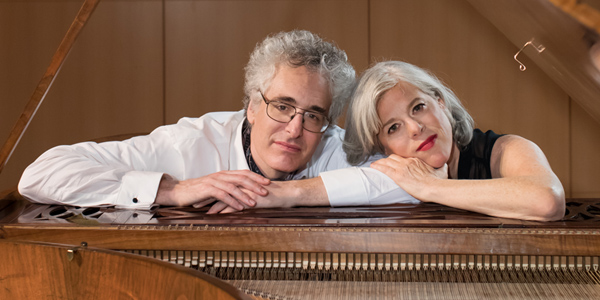 On Saturday, March 16, we welcome back Musicians from the Valley of the Moon Festival. The Sonoma-based ensemble whose provocative and path-breaking performances were a major event at the 2018 Berkeley Festival, return with a new program, “The Multifaceted Brahms.” After many years of exploring, performing and recording the chamber music of the Classical and Romantic periods on period instruments, founders Tanya Tomkins and Eric Zivian concluded that these well-known pieces can be experienced in a completely new way, not only through the unique qualities of period instruments but through a full understanding of period style. Historical instruments also solve of many of the balance problems that can arise playing on modern instruments, while bringing out the humor, charm, and poignancy of the music.
On Saturday, March 16, we welcome back Musicians from the Valley of the Moon Festival. The Sonoma-based ensemble whose provocative and path-breaking performances were a major event at the 2018 Berkeley Festival, return with a new program, “The Multifaceted Brahms.” After many years of exploring, performing and recording the chamber music of the Classical and Romantic periods on period instruments, founders Tanya Tomkins and Eric Zivian concluded that these well-known pieces can be experienced in a completely new way, not only through the unique qualities of period instruments but through a full understanding of period style. Historical instruments also solve of many of the balance problems that can arise playing on modern instruments, while bringing out the humor, charm, and poignancy of the music.
In 1933, Arnold Schoenberg gave a provocative talk titled “Brahms the Progressive” in which he decried stereotypes of Brahms as conservative. Valley of the Moon’s program shows the varied aspects of the composer’s music. On the program are two songs for contralto, viola and piano (Op. 91), the Horn Trio (Op. 40), and the Piano Quartet No. 1 in G Minor (Op. 25).
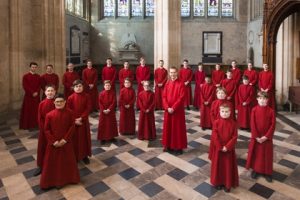 The Choir of New College Oxford, directed by Robert Quinney, is another highly renowned a cappella ensemble. They will be on tour next year, and we will have the pleasure of presenting them in a performance on Monday, April 8, at Grace Cathedral. Founded in 1379, this is probably the oldest continually performing choir in the world. It is firmly established as one of the most acclaimed British choral ensembles featuring boy trebles and men. Their distinctive sound embodies the splendor of the English choral tradition. Their program, “I Heard a Voice” features some of the greatest settings of commemorative music from the Renaissance, including works of Giovanni Pierluigi de Palestrina, Tomás Luis de Victoria, Josquin des Prez, Francisco Guerrero, Walter Lamb, Nicholas Ludford, John Taverner, John Sheppard, and Thomas Tallis.
The Choir of New College Oxford, directed by Robert Quinney, is another highly renowned a cappella ensemble. They will be on tour next year, and we will have the pleasure of presenting them in a performance on Monday, April 8, at Grace Cathedral. Founded in 1379, this is probably the oldest continually performing choir in the world. It is firmly established as one of the most acclaimed British choral ensembles featuring boy trebles and men. Their distinctive sound embodies the splendor of the English choral tradition. Their program, “I Heard a Voice” features some of the greatest settings of commemorative music from the Renaissance, including works of Giovanni Pierluigi de Palestrina, Tomás Luis de Victoria, Josquin des Prez, Francisco Guerrero, Walter Lamb, Nicholas Ludford, John Taverner, John Sheppard, and Thomas Tallis.
 Finally, on Sunday, May 19, we will present two of the finest interpreters of lute song in the world today, Iestyn Davies, Countertenor, and Thomas Dunford, Lute, in a program entitled “England’s Orpheus.” Davies, one of England’s greatest living countertenors, sings songs by three composers—John Dowland, Henry Purcell, and George Frideric Handel—each of whom was likened to Orpheus, the mythical musician. For these songs—at times melancholy, tender, and bawdy—he is joined by the brilliant young lutenist Thomas Dunford, who has been called the “Eric Clapton of the lute” (BBC Music Magazine).”
Finally, on Sunday, May 19, we will present two of the finest interpreters of lute song in the world today, Iestyn Davies, Countertenor, and Thomas Dunford, Lute, in a program entitled “England’s Orpheus.” Davies, one of England’s greatest living countertenors, sings songs by three composers—John Dowland, Henry Purcell, and George Frideric Handel—each of whom was likened to Orpheus, the mythical musician. For these songs—at times melancholy, tender, and bawdy—he is joined by the brilliant young lutenist Thomas Dunford, who has been called the “Eric Clapton of the lute” (BBC Music Magazine).”
Subscribe today, and reserve your seats for 6 great early music programs. SFEMS Members Save 25%; Non-Members Save 15%. Subscribers also can purchase preferred tickets for our special presentations at substantial savings.
Events for the 2018–19 series are currently only available on subscription. The best seats in the house are being held for new and returning 2018–19 season subscribers until August 13, when individual tickets for series concerts, special events, and Mini Series subscriptions will be available at savings of up to 20% for SFEMS members. You can download and print a mailable subscription form at our website, call the box office at 510-528-1725 or email us at tickets@sfems.org.

